| History - 49th A.I.B. - Company 'B' |
 | Index
|
| Index
| | Next |
| Next |
|
(Pages 29-32)
|
3 April (con't)
We began to clear the houses behind the foxholes, but the attack had to be held up while Co. C was taking the right flank, so we settled down to eat some of the food we found in the houses, and relaxed for a bit. A four man patrol took off, Burke, Hernandez and Walker crossing the river, while Flood protected their rear. They returned with several prisoners and the information that the town was apparently clear. The third platoon, acting on this information, took off, crossed the river and cleared some of the houses. Moving up the streets they sighted enemy tanks, and Pfc. Alpert fired a bazooka at one of them, damaging the tracks. Walker and Hernandez crept around behind the buildings flanking the tanks, and Walker let go with a bazooka round that hit the tank, possibly wounding some of the men. The platoon withdrew to the two houses next to the river at that time, and remained there until relieved by the 83rd Division.
The fourth platoon, following the third across the river were held up by sniper fire. Some of the men were able to withdraw into some houses, but the rest were pinned down for almost an hour, before the sniper could be found and disposed of. Burke and Walker, in their wanderings. found a German hospital, where a Sergeant from the 53rd Engineers, who had been wounded the day before,

|

was prisoner. They brought him back to the American lines, finishing off a very busy and successful day.
The 83rd Division arrived to relieve us and we pulled back through the rain, to where a hot chow and the chance for a few hours rest awaited us. Five minutes after we left, the town surrendered to the 83rd Division. The Germans' mission at Neuhaus had been to hold at all cost, and they had almost done it. We had suffered many casualties. Pfc. Charles Righini and Pfc. Solon Feldman bad been killed. Lt. William Lowery, Pfc. Errol Davis, Pvt. William Gordon, Pvt. Lloyd Gilkey, Sgt. George Hutson, Pfc. David Low, Pfc. Robert Swenson, Sgt. Al Shapiro, S/Sgt. George Konopasek, Pfc. Barry Maley, and Pvt. Leon Gray had been wounded in the two day battle. Another Medic, Pfc. Charlie Schrum, had lost his life while going to the aid of the wounded.
We bad come to admire and respect our aid men as no other group in the company. They had risked their necks many times to go out, under fire, to the aid of some poor Joe who was lying there wounded. No matter how heavy the fire, they had gone to him unhesitatingly. No one can say that the medics ever fell down on the job, and they have received enough purple hearts, and citations to prove that they often did a great deal more than their job.
|
-- 29 --
|
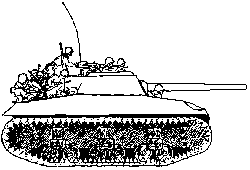
With the capture of Neuhaus, and Paderborn to the north, the last escape corridor from the Ruhr pocket was sealed up. The krauts caught in this pocket now faced either surrender or death.
4 April
We were alerted for further movement, had some hot coffee. and pulled out at 0520. We traveled to a town called Geseke, Germany, where we were placed in Division Reserve, and had our first chance to sleep for a long time. How we went to it!
5 April
We ate early chow and started off at 0930, acting as advance guard in the convoy. Our Battalion Recon did most of the work, but occasionally a platoon would detach itself and check over an area for enemy troops. We passed through Overhagen, Heringhausen, Benninghausen, Eickelborn, and Ostinghausen in this manner, flushing out several prisoners. At Ostinghausen, the second platoon hit the jackpot, taking a whole company, which was marching down the road looking for someone who would take them.
|
Just before dusk the third platoon set out to contact the 95th Division, reported to be in a little town northeast of us. After a wild ride, made even wilder by the pitch darkness of the night and the slippery road, they finally did locate the 95th only getting lost two or three times, and only damaging one track, which ran into a tree in the dark. They returned in the wee small hours with the injured track in tow.
6 April
We departed from Ostinghausen at 1020, with the second platoon again in the lead, and again acting as advance guard. We moved south towards Opmunden, where the column was stopped by several Regal Mines strung across the road. The Engineers were called up, but before they got there, Brewers squad had picked up the mines and moved on down the road. We hit a roadblock then, and the Burgermeister of Opmunden came peddling out on a bicycle to meet us, offering to surrender the town. He returned to town and brought out about 50 prisoners, and we moved in to check the town further. While the column was halted, someone fired a shot from behind a barn, and several tanks and half-tracks opened up on the barn, reducing it to a smoking rubble. Whoever tired the shot was no doubt sorry he ever started the whole thing.
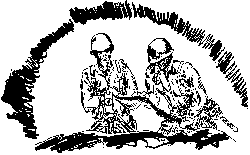
|
-- 30 --
|
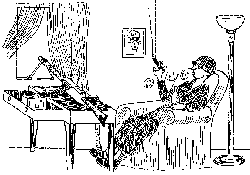
We pulled back to Bad Sassendorf, arriving about 1530, where we joined the 11th Airborne, who were already dug in around the town, and set up a defense. We then proceeded to check the town, routing out many prisoners and DPs. At 1800 we left Bad Sassendorf, and proceeded towards Elfsen and Mullingsen.
The second platoon had passed through Elfsen when the column was opened up on by high velocity anti-tank fire. The second, fifth, and third squads raced madly for the outskirts of Mullingsen and set to work cearing out the houses. The first and fourth squads were behind a tank, and could not advance on the road, so the men dismounted and advanced along the road. The second platoon set up a defense, while the tanks began to cut loose.
The third platoon was behind the second when the anti-tank fire started, and made immediately for the shelter of two buildings before they could be bit. Here they waited till the fire slackened. Then they moved up with the second platoon, and set up a defense for the night.
The first platoon, though behind the leading platoons, drew fire from the right front, from a probable distance of about two kilometers. The civilians in the area expressed the belief that it was a French weapon of about 65 mm. When the fire had subsided, the first moved up on foot to join the other two platoons. The confusion had been great during this brief skirmish, but
|
we had managed to pull it together in good time, and casualties were light. Pfc. Robert Craig. Pvt. James Frisch, and Pvt. Roger Greene were slightly injured in the deal. We didn't capture any prisoners; we saw a small force of Germans in the woods, but we received orders not to mess with them, so we didn't. They didn't bother us either, and for all we know they are still wandering around somewhere.
7 April
We moved out early and continued into Mullingsen, clearing out the town, and this time taking several prisoners. The first platoon then proceeded to a small town southwest of Mullingsen, called Lendringsen, but found no enemy there. On the way, however, they cleared a patch of woods, flushing out several SS men. The company then reorganized, and with the first platoon in the lead mounting on tanks, the second following in tracks, and the third platoon walking, we proceeded to the town of Hiddingsen,
where the first platoon dismounted and cleared out the place. We continued west, clearing Ruplah, Deiringsen,
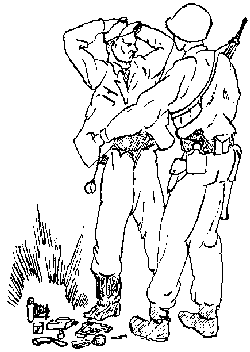
|
-- 31 --
|
Meiningsen, and Epsingsen, collecting a creditable band of prisoners, and picking up several souvenirs along the way. We got word to hold up at Epsingsen, and were placed in Division Reserve again. Mail was brought up, and we fell in at the tail end of the CCB column, while A Co. drew the point assignment. Not at all displeased with this 'rear echelon' assignment, we followed along as the column wound an erratic course through Ampen, Ost Onnen, Rollingsen, Sievenngen, and Gerlange.
Toward evening we received word that Co. A. in the point had run into an ambush, and we were rushed up to their support. We reached the area, and dismounted to dig in, while 88 fire was turned on us. This fire fell to our rear, however, and there were no casualties. We spent the night in our foxholes, awaiting a possible attack but none came. It was cold in those foxholes, but we were worn out enough to catch a few winks of sleep anyhow.
8 April
A thick fog rolled in during the night and stayed with us throughout the early part of the morning. At 0900 we were given the mission of flanking and capturing the north-south road out of Werl, cutting off the Germans retreat while the 95th Division and Task Force Van Houten attacked from the front and flanks. We started out on this mission, but were called back to West Onnen, where we ate chow at about 1300 and at about 1600 we
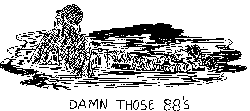
|
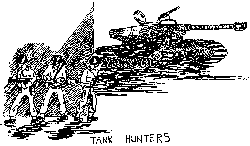
moved out to an area just east of Werl. We sat around here for about two hours, while whatever our plans were changed a couple of times, and finally moved into Werl, where we went to work clearing out certain areas of the town that had been overlooked before. We took several prisoners and were fired upon a few times by snipers. Tanks were brought up to knock out the snipers, and no casualties were received. As the company moved out of Werl, the fourth and Headquarters platoons, still in town, took a terrific pasting from enemy artillery.
At 2100, Task Force Roseborough. of which we were a part, moved out to attack a little town west of Werl, known as Ost Buderich. This attack was made just at nightfall. The second platoon moved out mounted on light tanks, the first and fourth following in half-tracks. The third platoon, late in leaving Werl arrived in time to support the other three platoons as they where entering the town.
We moved out across the intervening fields, firing our vehicular weapons, while the tanks blasted away with their 75s. The tracers and the shells firing into the night made a very beautiful and awe inspiring spectacle, somewhat reminiscent of a Fourth of July fireworks display, although, a great deal of care had to be exercised at times that we did not come too close to hitting each other with the overwhelming firepower
|
-- 32 --
|